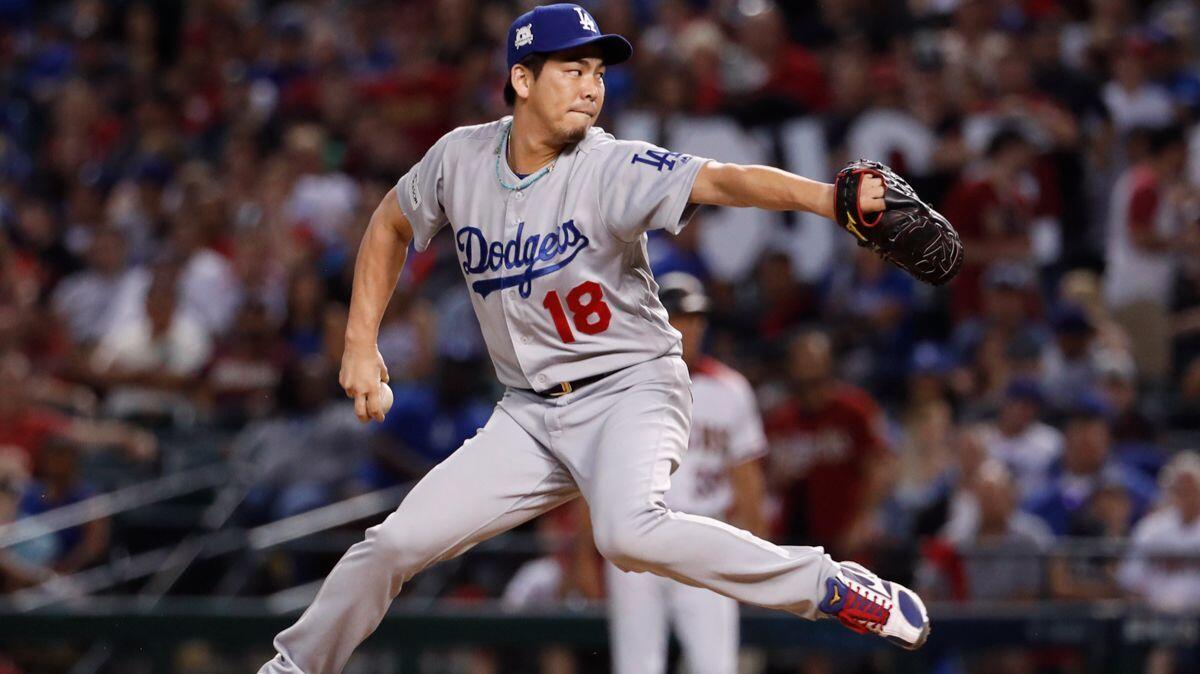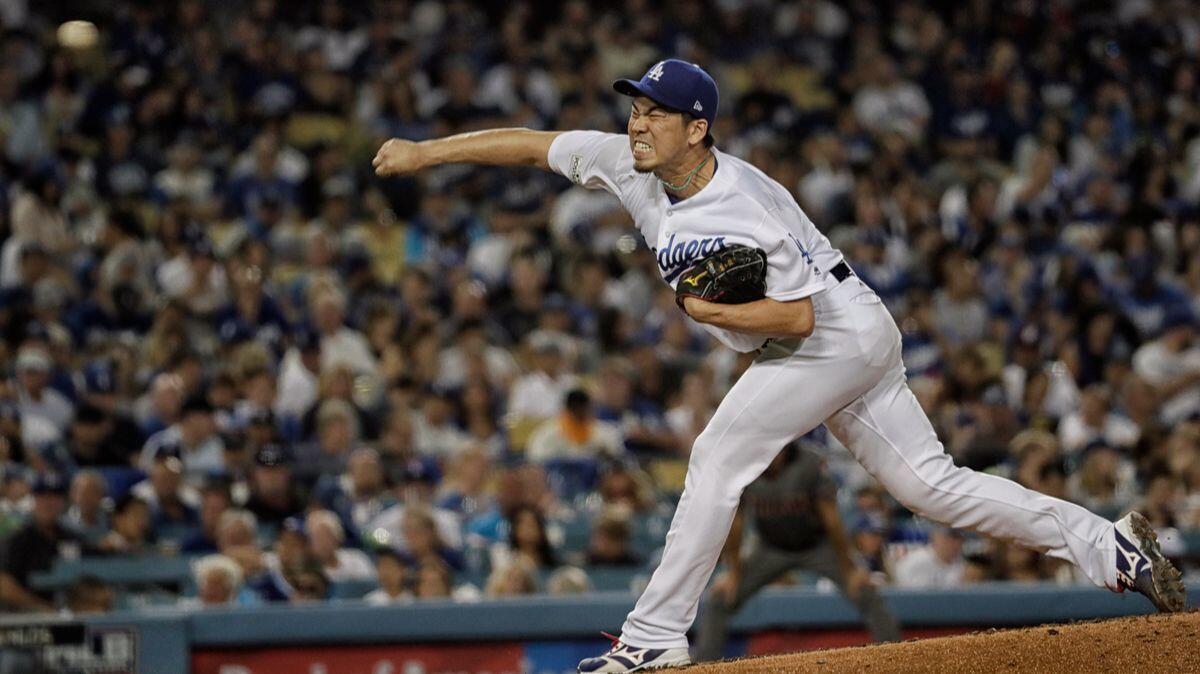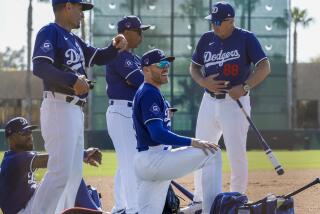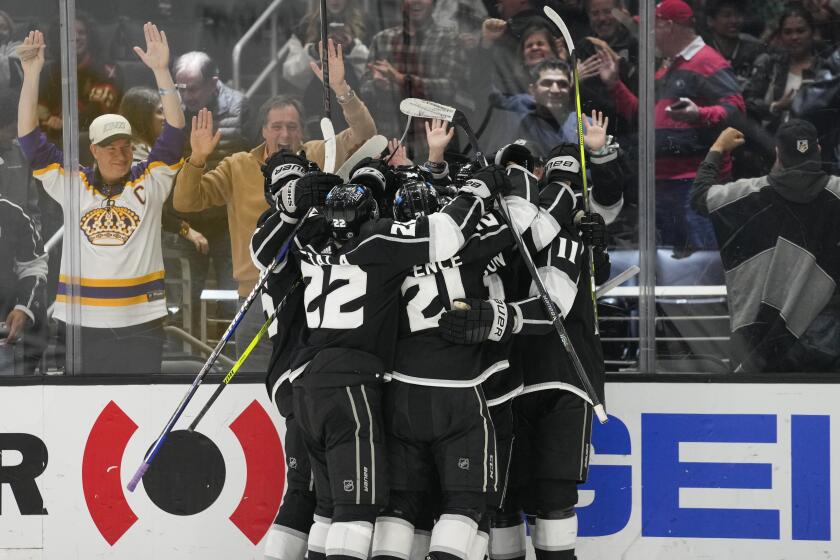Column: Kenta Maeda might be the Dodgers’ X factor out of the bullpen

Standing in a puddle of champagne and beer as the Dodgers celebrated their passage to the National League Championship Series, Kenta Maeda was asked for this thoughts on how Yu Darvish had pitched.
The question was basically a veiled invitation to praise his countryman, who went five strong innings Monday as the Dodgers completed a three-game sweep of the Arizona Diamondbacks.
Maeda passed. He didn’t feel worthy of offering an opinion on a pitcher of Darvish’s stature.
“It’s not really my place to say,” he said politely, speaking in Japanese.
Maeda offered an equally modest response when a Japanese reporter congratulated him on his own contribution in Games 2 and 3 of the NL division series.
“I didn’t do much,” he said bashfully.
It’s obvious the soft-spoken right-hander would never say it, so I will: He has been the single greatest revelation of this postseason, a late-inning force that has fundamentally changed the Dodgers.
The last time the team had a setup man this dominant was four Octobers ago, when a resurgent Brian Wilson was pitching in front of Kenley Jansen.
“Unbelievable,” Clayton Kershaw said.
Maeda’s overnight transformation from marginal starting pitcher to lights-out setup man has altered how manager Dave Roberts views and utilizes a bullpen that was vulnerable over the final month of the regular season.
Maeda is as electric as a reliever as he was cautious as a starter, his dominance such that Roberts and the front office had to see him pitch out of the bullpen only a few times before entrusting him to pitch the eighth inning of the final game against the Diamondbacks.
Maeda retired the side to preserve a 3-1 advantage, starting the inning by striking out A.J. Pollock and ending it by striking out Chris Iannetta.
Maeda started 25 games this season, and had a record of 13-6 with a 4.22 earned-run average. But there was no place for him in the postseason rotation of Kershaw, Darvish, Rich Hill and Alex Wood.
The Dodgers included him on their division series roster with plans of deploying him as a reliever against right-handed hitters.
His role was expanded after what he did in the fifth and sixth innings of Game 2, when Roberts called on him to face the right-handed hitters in the middle of the Diamondbacks lineup, Pollock, Paul Goldschmidt and J.D. Martinez. Maeda retired all three of them, striking out Pollock and Martinez.
“The stuff played up,” Roberts said. “The velocity ticked up two, three miles an hour. The slider’s still sharp.”
The fastball, which was typically in the low 90s when Maeda was a starter, touched 96 mph.
“I’m thinking I’m going to pitch only one inning, so I’m exerting more effort,” Maeda said.

Roberts’ management of the team changed immediately. Darvish pitched five strong innings in Game 3, but Roberts didn’t waste any time removing him when he started the sixth by striking the brim of Christian Walker’s helmet.
Maeda’s presence had already shortened the game in Roberts’ mind, affording the Dodgers the luxury of turning to another one of their high-leverage relievers at an earlier stage.
Maeda had no idea he would pitch the eighth inning until he saw fellow right-hander Brandon Morrow pitch the sixth. Maeda acknowledged pitching in the eighth wasn’t like pitching in the fifth or sixth.
“There was some nervousness involved,” Maeda said.
Maeda said he was motivated by his sense of obligation, particularly toward Darvish, who was in line for the victory.
Both pitchers are from Japan’s Osaka prefecture and Maeda is a longtime admirer of Darvish, who is two years older.
“I felt I couldn’t lose it for him,” Maeda said. “Maybe I was able to channel those feelings into the baseball.”
Maeda also didn’t want to burden Jansen, the closer.
“I didn’t want Kenley to have to come out in the middle of the inning,” he said.
Maeda had no reason to be concerned. The Diamondbacks couldn’t touch him.
Maeda made only four relief appearances in the regular season, but said he had become accustomed to pitching out of the bullpen.
“Once you get into the game, the emotions kick in whether you want them to or not,” he said.
Maeda was content to have a meaningful role in the deciding game of the division series.
“It’s the postseason,” Maeda said. “I have strong feelings about wanting to play a part in helping the team win. As a player, I’m really happy they let me pitch and contribute in a game we won.”
These October performances are certain to raise questions about whether Maeda’s future is in the bullpen. The main obstacle to a permanent move would be his contract.
Maeda is in the second year of an eight-year contract that guarantees him a base salary of $3 million. He can earn an additional $10.15 million in incentives each year, but would have trouble earning any of that as a reliever, other than the $150,000 bonus for making the opening-day roster.
That can be sorted out later. For now, Maeda can feel secure knowing he has the respect of his teammates, who admire how he moved to the bullpen without any complaint and has pitched as well as he has.
“I don’t think anyone in this room would’ve thought that Kenta Maeda would’ve got the ball in the eighth inning of a two-run game to pass the baton over to Kenley,” third baseman Justin Turner said.
The next time it happens, it won’t be a surprise.
Follow Dylan Hernandez on Twitter @dylanohernandez
More to Read
Get our high school sports newsletter
Prep Rally is devoted to the SoCal high school sports experience, bringing you scores, stories and a behind-the-scenes look at what makes prep sports so popular.
You may occasionally receive promotional content from the Los Angeles Times.






